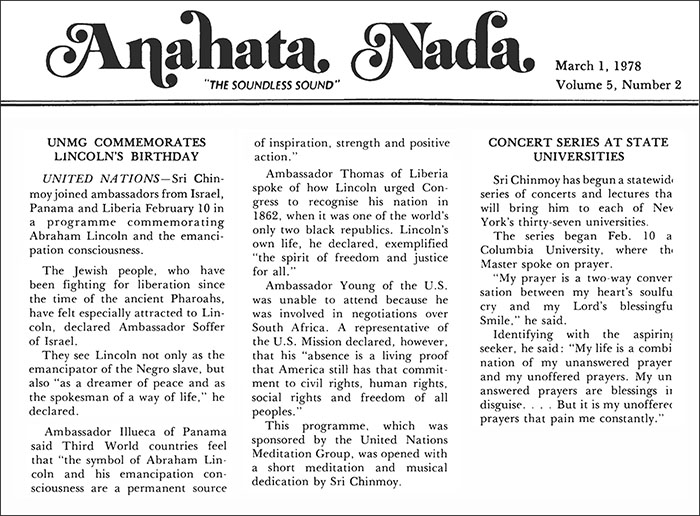UNMG COMMEMORATES LINCOLN’S BIRTHDAY
UNITED NATIONS — Sri Chinmoy joined ambassadors from Israel, Panama and Liberia February 10 in a programme commemorating Abraham Lincoln and the emancipation consciousness.
The Jewish people, who have been fighting for liberation since the time of the ancient Pharaohs, have felt especially attracted to Lincoln, declared Ambassador Soffer of Israel.
They see Lincoln not only as the emancipator of the Negro slave, but also “as a dreamer of peace and as the spokesman of a way of life,” he declared.
Ambassador Illueca of Panama said Third World countries feel that “the symbol of Abraham Lincoln and his emancipation consciousness are a permanent source of inspiration, strength and positive action.”
Ambassador Thomas of Liberia spoke of how Lincoln urged Congress to recognise his nation in 1862, when it was one of the world’s only two black republics.
Lincoln’s own life, he declared, exemplified “the spirit of freedom and justice for all.” Ambassador Young of the U.S. was unable to attend because he was involved in negotiations over South Africa. A representative of the U.S. Mission declared, however, that his “absence is a living proof that America still has that commitment to civil rights, human rights, social rights and freedom of all peoples.”
This programme, which was sponsored by the United Nations Meditation Group, was opened with a short meditation and musical dedication by Sri Chinmoy.
CONCERT SERIES AT STATE UNIVERSITIES
Sri Chinmoy has begun a statewide series of concerts and lectures that will bring him to each of New York’s thirty-seven universities.
The series began Feb. 10 a Columbia University, where the Master spoke on prayer.
“My prayer is a two-way conversation between my heart’s soulful cry and my Lord's blessingful Smile.” he said.
Identifying with the aspiring seeker, he said: “My life is a combination of my unanswered prayer and my unoffered prayers. My unanswered prayers are blessings in disguise .... But it is my unoffered prayers that pain me constantly.”
Published in Anahata Nada, March 1, 1978, Volume 5, Number 2

